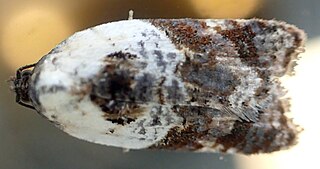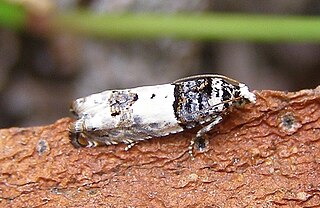
The Tortricidae are a family of moths, commonly known as tortrix moths or leafroller moths, in the order Lepidoptera. This large family has over 11,000 species described, and is the sole member of the superfamily Tortricoidea, although the genus Heliocosma is sometimes placed within this superfamily. Many of these are economically important pests. Olethreutidae is a junior synonym. The typical resting posture is with the wings folded back, producing a rather rounded profile.

Acleris variegana, the garden rose tortricid moth or fruit tortricid, is a moth of the family Tortricidae. It has a Palearctic distribution. The moth flies from July to September mainly at night and is attracted to bright lights. The larvae feed on various trees and shrubs including rose and apple.

Spilonota ocellana, the bud moth, is a moth of the family Tortricidae. It is found in the Palearctic realm, from North Africa and Europe to Iran, eastern Russia, China, Korea, and Japan. It is also present on Madeira and in North America.

Acrobasis nuxvorella, the pecan nut casebearer, is a moth of the family Pyralidae described by Herbert H. Neunzig in 1970. It is found in the United States in eastern New Mexico, Texas, Oklahoma, Louisiana, Missouri, southern Illinois, Mississippi, Alabama, Florida, Georgia, South Carolina and North Carolina.

Cydia caryana, the hickory shuckworm moth, is a moth of the family Tortricidae. It is found in North America.

Gretchena is a genus of moths belonging to the subfamily Olethreutinae of the family Tortricidae.

Ditula angustiorana, the red-barred tortrix, is a moth of the family Tortricidae found in Africa, Asia, Europe and North Africa. Other common names are the fruit-tree tortrix and the vine tortrix. The moth was first described by Adrian Hardy Haworth in 1811.

Gypsonoma sociana is a moth of the family Tortricidae. It is found from Europe to Russia, China and Japan.

Blastesthia turionella, the pine bud moth, is a moth of the family Tortricidae. It is found from Europe to eastern Russia, China, Korea and Japan. In the mountains, it occurs to elevations of up to 1,200 meters above sea level.

Epinotia tenerana, the nut bud moth or alder tortricid, is a moth of the family Tortricidae.

Gypsonoma oppressana, commonly known as the poplar bud-worm, is a moth belonging to the Tortricidae family. It is found on Madeira and in central and southern Europe, from Transcaucasia to Kazakhstan and Tajikistan.

Zeiraphera ratzeburgiana, the spruce bud moth or Ratzeburg tortricid, is a moth of the family Tortricidae. It is found from northern and central Europe to eastern Russia and China. Zeiraphera ratzeburgiana is a taxonomically similar species to Zeiraphera canadensis and can only be distinguished by an anal comb found in Z. canadensis.

Acleris hastiana is a moth of the family Tortricidae. It is found in Europe, northern Iran, Kazakhstan, Ala Tau, central Siberia, Irkutsk, the Amur region and China. In North America it is found from the north-eastern United States across southern Canada to British Columbia and south along the Pacific Coast to California.

Cochylimorpha alternana is a moth from the family Tortricidae. It is found from France and Great Britain east to the Ural Mountains and Asia Minor. It is also present in North Africa (Libya) and Iran.

Spilonota laricana is a moth of the family Tortricidae. It is found in most of Europe, China, Japan, Russia and the Nearctic realm.

Archips argyrospila, the fruit-tree leafroller moth, is a moth of the family Tortricidae. It is found in most of the United States and southern Canada.
Gretchena ochrantennae is a species of moth of the family Tortricidae. It is found in Morona-Santiago Province, Ecuador.
Spilonota albicana, the white fruit moth, larger apple fruit moth or eye-spotted bud moth, is a species of moth of the family Tortricidae. It is found in China, Korea, Japan and Russia. It has been accidentally introduced in the Netherlands.

Epinotia abbreviana is a moth of the family Tortricidae. It is found in Europe and was first described by Johan Christian Fabricius in 1794.




















